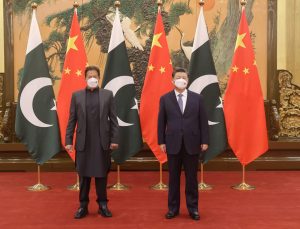Pakistan Prime Minister Imran Khan concluded his four-day visit to China on Sunday after holding a brief meeting with his counterpart Li Keqiang and President Xi Jinping. The two countries issued a 33-point joint statement to highlight the success and significance of the visit. Here are some key takeaways.
According to the statement, both sides reiterated their support for each other on issues concerning each other’s core interests. In this regard, China reiterated that “the Kashmir issue was a dispute left from history” and “should be properly and peacefully resolved based on the UN Charter, relevant Security Council resolutions and bilateral agreements.”
Apparently hitting out at India’s ending of Jammu and Kashmir’s special status, the Chinese side said it “opposes any unilateral actions that complicate the situation.” Moreover, the Chinese leadership reaffirmed its support for Pakistan in “safeguarding its sovereignty, independence and security, as well as promoting its socio-economic development and prosperity.”
Pakistan, on its part, “expressed its commitment to One-China Policy and support for China on Taiwan, South China Sea, Hong Kong, Xinjiang and Tibet.”
For Khan and the Pakistani military, China’s view on the issue of Kashmir and its sovereignty were perhaps among the key gains. More importantly, with both countries explicitly supporting each other on core issues, Pakistan has openly declared that it has chosen China over the U.S. as far as the alignment of Pakistan’s interests and regional security and economic policy is concerned.
The joint statement also mentions that China “recognized Pakistan’s sacrifices and efforts in the fight against terrorism,” and both countries reiterated their “commitment to fighting terrorism in all its forms and manifestations.” It is important to mention here that while Khan was in China, Baloch militants carried out an attack targeting two major military posts in Balochistan. At least nine Pakistani soldiers died in the attack. The attack was probably aimed at undermining Khan’s visit to China and was an effort to show the international community and Beijing that Balochistan is not safe for investments unless the Baloch separatists are taken on board.
However, the incident didn’t figure in the joint statement. In fact, both sides expressed determination to safeguard the China-Pakistan Economic Corridor (CPEC) from all threats and negative propaganda. They underlined the importance of Gwadar, a port city in Balochistan, as a “central pillar” of CPEC and a vital node in regional connectivity. Moreover, the joint statement said that “the two sides are ready to discuss with Afghanistan the extension of CPEC to Afghanistan.”
In Afghanistan, the two sides agreed that a “peaceful, stable, united, safe, and secure Afghanistan” was important for prosperity and development of the region and agreed to keep “close cooperation on Afghanistan in the future.”
Moreover, both countries “underscored the need to expedite humanitarian aid to Afghanistan and its people to avert the looming crisis” and also renewed calls to unfreeze Afghan cash assets frozen internationally.
The joint stance on Afghanistan shows that Pakistan’s position on Afghanistan is very much acknowledged by China. Both sides should be expected to cooperate more closely in the coming months to tackle issues of militancy emanating from Afghanistan and strengthen the Taliban’s hand.
It is too early to say whether joint China-Pakistan pressure would force the Taliban to end sanctuaries in Afghanistan for the Tehrik-i-Taliban Pakistan (TTP) and Baloch insurgent groups, but it’s clear that Beijing’s economic interests are tied to a peaceful Afghanistan-Pakistan border region and a stable Balochistan.
The Pakistani side highlighted that China has become a “popular education destination.” The discussion on expanding cooperation in the education sector comes at a time when thousands of Pakistani students studying in China are stuck back home due to Beijing’s COVID-19 restrictions.
Both sides agreed that “while ensuring safety against COVID-19, China will arrange for Pakistani students to return to China and resume classes in a prudent manner.” The development is significant as Khan has been criticized bitterly for failing to ensure that Pakistani students are able to return to China.
On the military front, the two sides will be expanding military-to-military contacts and cooperation. Pakistan’s military is known to have maintained closer contact with the U.S. military. Historically, a majority of the training engagements of Pakistani officers have taken place in the United States and other Western countries. However, Pakistan’s close cooperation with China and deteriorating ties with the U.S. means that Pakistan’s military training and contacts with Beijing are set to grow as well in the coming months and years.
It is important to note that the joint statement didn’t mention whether China was making any new major hard cash investments in CPEC and other Special Economic Zones. The statement only noted that “the two sides signed or concluded a number of agreements / MoUs, covering bilateral cooperation in areas of economic and technical, industry, investment, infrastructure, space, vaccine, digitalization, standardization, disaster management, culture, sports, and vocational education.”
The joint statement, however, laid focus on “CPEC’s high-quality development” and “ensuring the smooth operation of completed projects and the timely completion of projects under construction.”
This essentially shows the Chinese side wants Pakistan to ensure that the projects under construction get completed. As I mentioned in my last article, the Chinese are not happy with Pakistan’s inability to return loans.
This irritant is likely to persist and may continue to reflect in the Chinese thinking when it comes to making investments. To earn more capital, Pakistan will have to demonstrate that while it can protect China’s interests, it’s a place where Chinese investors are getting substantial returns.

































